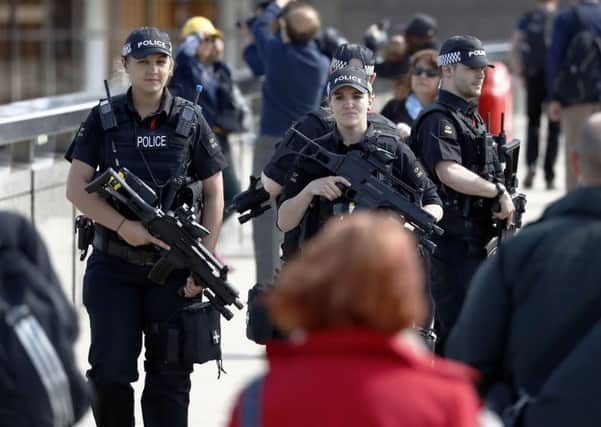Kenny MacAskill: We need to look at house arrest and tagging to counter terror


However, there will be tough questions to be answered by the next Prime Minister, but not on how we’ll press the button or deal with Europe, rather how we’ll tackle terrorism. So far Theresa May has been failing on the latter, though Jeremy Corbyn equally has issues to answer.
Moral questions are always far harder for a politician than reactive ones. These will pose philosophical questions as to how a liberal democracy should address the rights of those within it who are intent on causing that democracy significant harm. Therein lies the conundrum. How do we protect our society without undermining the very values that underpin it? A serious debate is going to have to take place and tough decisions will require to be made.
Advertisement
Hide AdAdvertisement
Hide AdA few debates this campaign were akin to a tawdry game show, with some in the audience vying in cries of ‘press the button.’ The closest those recumbent warriors have come to combat is through the cinema screen. Military figures I’ve met blanche at the thought. Even if multilateralists, they’re aware it’s the end of the human race.
Theresa May is apparently tough, as she’d press the button, while Corbyn is weak as he’d vacillate. I’m minded of a tale by the Cold War historian Robert Service who narrated how Leonid Brezhnev, the General Secretary of the Soviet Union, was required to press the button during war exercises by Warsaw Pact Forces. When it came to it, he visibly whitened and sought repeated assurances that nothing could go wrong. He was a cold warrior. That he hesitated in a training exercise shows the flippancy of those who deem it a simple pressure of the finger. I prefer somebody with their finger on the button, who’s concerned about the consequences, to someone who thinks it a simple task.
However, the tough decisions to be made after this election won’t be about launching a nuclear strike but how our society reacts to terrorists within it. Radicalised Jihadis, many of whom have received training if not fighting experience, are now in our communities.
Questions do need asked about why police numbers in England were allowed to drop markedly, Islamist fighters were given free movement, and arms sold to nations that sponsor Jihadi violence. Many will radar in on the Prime Minister in both her current position and past office of Home Secretary.
But this issue is also about what we need to do now, not just how we got where we are. The actions in Manchester and London were an attack on our society and way of life. Planes are targeted as being representative of the West, and their downing is symbolic of its vulnerability. Likewise concerts or night clubs are seen as representative of our decadence and legitimate targets to be destroyed in the terrorists’ warped value system.
Perverse they may be, but the threat is all too real. There are thousands on a wider potential threat list and hundreds, if not thousands who have been going to the Middle East. It’s been a long time coming but the worsening of the situation there has accelerated the process. I recall as Justice Secretary being made aware of individuals from Scotland ostensibly flying to Kenya for a safari, but in reality, crossing north into Somali to contact Al Qaida North Africa. Access to Syria through Turkey requires even less ingenuity.
Apparently, notifications have been given to police and security services about various individuals in recent atrocities. It’s too early to speculate as to whether there has been any failure on their part. There will have to be investigations. It’s hard to speculate on this matter because the extent of the warning or intimation given is unknown. Moreover, the numbers notified won’t be handfuls but hundreds, weekly. Such monitoring is resource-intensive, and manpower and technology is limited. Deciding who to watch is a skill but also plain good luck at times. Resources do matter, though, and that needs addressed by whoever is elected - and fast.
However, there’s no jail for thought in our society. But I am also aware that the hardest individuals for the police to deal with weren’t those who had committed a crime, but those who they knew had the potential and often intention of doing so. A ticking bomb in our communities. Many were often a risk of causing serious harm and the efforts that were required to monitor them for public safety were huge. It was one of the reasons for bringing in Orders for Life Long Restriction to control them when they had entered the system. The terrorist threat is even greater in both numbers and risk.
Advertisement
Hide AdAdvertisement
Hide AdMost of these individuals who pose a potential threat are UK citizens. They cannot be deported. Internment in Northern Ireland was an unmitigated disaster that cannot be repeated. It simply assumed that many with particular views were potential terrorists.
However, some balance with the rights of our wider society is needed. Control orders were replaced by Terrorist Prevention and Investigation Measures (TPIMs). Both seem to have been fraught or hugely complex. But some similar but refined measures may still be needed. It could mean house arrest or tagging and cannot be indefinite. Given the implications for individual liberty there needs to be both democratic oversight and judicial scrutiny. Blaming ECHR is a smokescreen. This can be done within it.
It’s a hugely tricky question given the need to protect our values as well as our citizens. But, given the threat and the rights of the rest of society the debate needs to begin. That’s the tough decision, not pressing a nuclear button.